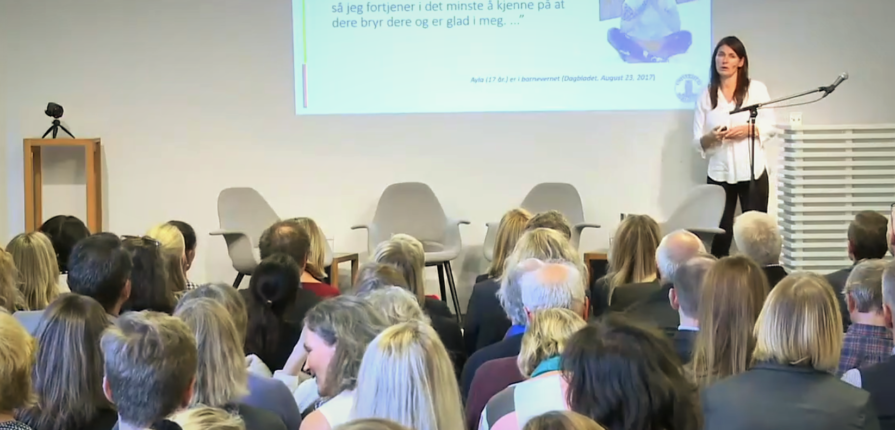NEWS: Marit Skivenes and Katre Luhama presented research findings to the Norwegian Minister of Children and Equality.
Norwegian child protection works well when comparing with other countries, and Norway ranks high on international indexes of child welfare. Nevertheless, there is clear potential for improvement when it comes to education of child protection workers, the involvement of children and the regulation of discretionary practice.
This was the main message from Marit Skivenes during a seminar organised by the Norwegian Ministry of Children and Equality in the light of the heavy criticisms of the Norwegian child protection system in both domestic and international media.
The Minister Linda Helleland participated, together with a number of other policy makers and NGOs from the child welfare field, as well as a large press corps.
Need for longer education
Skivenes presented the knowledge status for child welfare research, and also findings from the research done at Centre for Research on Discretion and Paternalism.
She pointed out that the Norwegian child protection service works well in comparison to other countries, and that Norway is well placed in terms of rule of law.
Nevertheless, Skivenes believes that there are challenges, including lack of transparency.
– Although some judgments in child welfare cases are made anonymous and made available to the public, there are overall insufficient information and a lack of a factual public debate on child protection.
Furthermore, Skivenes gave some advice to the minister about what actions could be taken. Skivenes argued that child protection workers should be educated at the master’s level, that there is room for stronger regulation and less discretion, and a need to ensure better involvement of children in the processes.
Balance the rights
Also researcher Katre Luhamaa, the Centre’s expert on international human rights, was also invited to the seminar. Norway has nine child welfare cases that will be, or have recently been, heard by the European Court of Human Rights (ECtHR).
– Children’s rights have become more important to the ECtHR, but they do not trump other human rights. There is a need to balance children’s rights with the rights of biological parents, foster or adoptive parents, siblings and grandparents.
In the treatment of child welfare cases, the ECtHR leaves states wide discretion as long as the procedure has been fair.
Nevertheless, the court has stressed that the state is required to justify what risks the child is exposed to, to consider alternatives to care orders and that the aim should be family reunification, Luhamaa told the audience.
Full video from the seminar
Sesions held in English is marked in italics in the agenda below. Click on full-screen to navigate the video.
Agenda
- Åpning ved statsråden
- Norsk barnevern og det internasjonale perspektivet
Mari Trommald, direktør i Barne-, ungdoms- og familiedirektoratet - Ungdommer om synet på barns rettssikkerhet og barnevernets rolle
Ungdommer fra Forandringsfabrikken. - Hva med foreldrene?
Merethe Løland, leder i Organisasjonen for barnevernsforeldre, snakker om foreldreperspektivet i barnevernssaker. - Barnevern over landegrenser
Siri Sletner – nylig tilbakevendt ambassadør ved den norske ambassaden i Praha, Tsjekkia. - Barnevernet in international media
BBCs Tim Whewell, the journalist behind the documentary “Norway’s Silent Scandal”
Maciej Czarnecki, forfatter av boken Norsk barnevern sett utenfra og
Tone Tveøy Strøm-Gundersen, news editor in Aftenposten - Hva kjennetegner norsk barnevern, og hva skiller Norge fra andre land?
- Professor Marit Skivenes, Universitetet i Bergen
- Childrens rights in international context
Researcher Katre Luhamaa, Universitetet i Bergen - Når ambassaden ringer – å kommunisere barnevern med utlandet
- Gunnar Toresen, barnevernsjef i Stavanger
- Hvordan kan rettssikkerheten i barnevernet styrkes?
- Inga Bejer Engh, Barneombudet
- Debatt: Barnevernet
Inga Bejer Engh (Barneombud), Marit Skivenes (UiB), Jan Storø (OsloMet), Thea Totland (BARNAS- Stiftelsen barnas rettigheter og Barneadvokatene) og Pernille Pettersen Smith (fylkesnemnda).


